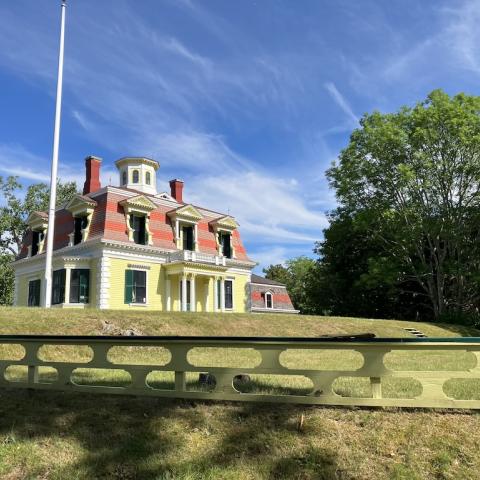
Marine biologists will use this bite mark to estimate the size of a shark that bit a paddle board at Cape Cod National Seashore/NPS
A Cape Cod, Massachusetts, man never saw the shark that tried to take a bite out of his paddle board, but national seashore officials say it likely was a great white shark that mistook the board for a seal.
"I don’t have a confirmed species yet, but more likely than not it was a white shark," Leslie Reynolds, the chief ranger at Cape Cod National Seashore, said Friday. "The scientists from the Massachusetts Division of Marine Fisheries I hope get a look at the board today and take a look at the bite marks.”
The attack happened Wednesday when the 69-year-old was paddle boarding at Marconi Beach in the national seashore. He had just ridden a wave towards the shore, hopped off about 30 feet from the beach and turned to head back out when the shark bit his board, Chief Reynolds said during a phone call.
As the man was getting ready to stand up on the board, "the shark – bang – bit the board, causing him to fall on the board," the chief ranger said. "He said it happened so fast. He compared it to riding on a bike and getting hit by a car.
"... He did not see the shark. And clearly the shark did not know what he was, either," she said.
The man quickly paddled back to shore, jogged down the beach to tell a class of surfers about the incident, and then reported it to park lifeguards, said Chief Reynolds.
The bite mark left on the paddle board was possibly 11.5 or 12 inches wide, she said, adding that marine scientists should be able to estimate the size of the shark from the indentations.
Cape Cod's great white sharks and gray seals have gained local and national attention. Both species existed long before Cape Cod was settled or became a popular destination, and in recent years their numbers have increased. Sharks have existed for more than 400 million years. As top predators, sharks are critical for maintaining a healthy and balanced marine ecosystem.
Seals are the major prey species for the great white shark, and as the seal population increases, the great white sharks have become more numerous. In recent years there have been confirmed reports of great white sharks feeding on seals close to shore, as well as great white shark sightings from spotter planes flying along the Outer Cape and near swimming beaches. While it is rare for a great white shark to bite a human, it did occur in Truro in 2012 when a 50-year-old man swimming off Balston Beach was bit on his left leg.
“We have a lot of white sharks coming close to shore feeding on seals," Chief Reynolds said Friday. "Over the month of August, we have an increase in white shark sightings very close to shore. And the manner of which the shark bit this board, from what I have learned from the scientists, led me to believe that it was a white shark that bit the board. But I'm waiting for confirmation.”



 Support Essential Coverage of Essential Places
Support Essential Coverage of Essential Places






